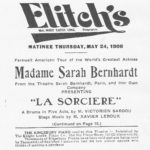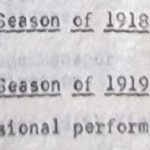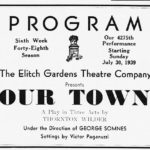The play that was the highlight of the season was Eugene O’Neill’s Pulitzer Prize play Anna Christie. Others included Frederick Lonsdale’s Aren’t We All and Lewis Beach’s The Goose Hangs High. Sutten Vane’s Outward Bound was also presented and was also to be among the play selections at Elitch during the 1940 and 1943 seasons.
Melville Burke succeeded Rollo Lloyd as director in 1925 and was to continue in that role through the 1929 season. Burke had extensive experience with stock companies and had acquired the ability to rehearse a cast and prepare a play to be performed within the limited time frames of stock theater.
In a 1927 edition of The Elitch Gardener, after recognizing “the fine quality of the performances” at the Theatre and “the remarkable smoothness of the productions,” tribute was paid to the skills of Melville Burke, noting that “he has the viewpoint of the actor because he formerly was an actor himself” and that he was called by a writer in the Theatre Arts Monthly “one of the few creative directors in the American theatre.”
The final play of the season, Anna Christie, was the dominant play, a drama, and a sharp contrast to some of the light and delightful comedies that easily and otherwise satisfied the mood of a summer audience.
For example, The Goose Hangs High was a play:
… that should give comfort to every distracted parent throughout the country Mothers and fathers who are worried about what they believe college life is doing to their children, transforming them from well-mannered, guileless boys and girls into fresh, fox-trotting cake-eaters and bobbed-hair, cigarette-smoking flappers, will find their fears quite groundless, because when the emergency arises the dear children know how to put aside their nonsense and turn up to be the best of trumps.’”
Anna Christie, the 1921 Pulitzer Prize-winning play by Eugene O’Neill, was hailed as “the most widely popular American play ever written.” John Mulvihill was persistent in his efforts to acquire the right to present the play at Elitch and, in doing so, he paid the highest royalty he had ever paid to date for such a right.
It may seem strange that an Irishman, such as Eugene O’Neill, should have conceived this colossal drama of an old Swedish captain and his daughter, who becomes a victim to his fear of the sea – which he makes an excuse for evading parental responsibility – and of an Irish stoker who falls in love with the girl and comes into conflict with the old squarehead, who is frantically determined that his girl never shall marry a sailor.
But O’Neill is an international artist. He has sailed the seven seas on tramp boats and rubbed elbows with the scum of the world in its greatest ports. His deep knowledge and understanding of the people about whom he writes and the conditions under which they struggle is the reason why Anna Christie contains so much dramatic dynamite that it sends crinkles down the blasé spines of New York and London audiences with its frank realities and uncompromising truths.
Florence Eldridge said that playing the part of Anna Christie was the greatest opportunity she ever had for, by common consent, it is “the finest role ever written in the history of the stage for an actress.”
No more poignant heroine of fiction or drama has been presented on the stage of any country than this tragic waif of the Northwest, who is redeemed from the depths of evil by the influence of the sea and a great love.
A Denver Post headline stated that the “Original ‘Anna Christie’ is Discovered Living in Denver.” The article noted, without identifying the person by name:
The woman who gave Eugene O’Neill the idea for one of he most gripping dramas ever presented upon the American stage – once a queen in the New York night world – now lives alone and forgotten in the section of the city (Denver) where red lights once flickered and painted women beckoned from gaily-trimmed windows.
[Borrillo, T. A. (2012). Denver’s historic Elitch Theatre: A nostalgic journey (a history of its times). Colorado. p. 135-137]
Theatre Staff:
- J. M. Mulvihill, President
- George L. Roberts, Treasurer
- Melville Burke, Director
- Donald Campbell, Stage Manager
- G. Bradford Ashworth, Scenic Artist
Resident Company:
- Florence Eldridge
- Buelah Bondi
- Diantha Pattison
- Edith Gordon
- Tom Powers
- C. Henry Gordon
- Moffat Johnston
- Edward Butler
- Douglas MacPherson
- Joseph Macaulay.
Productions:
- Week of June 14: Quarantine, by F. Tennyson Jesse
- Week of June 21: Kiki, by Andre Picard, adapted David Belasco.
- Week of June 28: Outward Bound, by Sutton Vane.
- Week of July 5: Chicken Feed, by Guy Bolton
- Week of July 12: The Goose Hangs High, by Lewis Beach.
- Week of July 19: Rollo’s Wild Oat, by Clare Kummer.
- Week of July 26: Lightning, by Winchell Smith and Frank Bacon.
- Week of Aug. 2: Cock O’ The Roost, by Rida Johnson Young.
- Week of Aug. 9: Aren’t We All?, by Frederick Lonsdale.
- Week of Aug. 16: The Bride, by Stuart Olivier.
- Week of Aug. 23: Anna Christie, by Eugene O’Neill


















